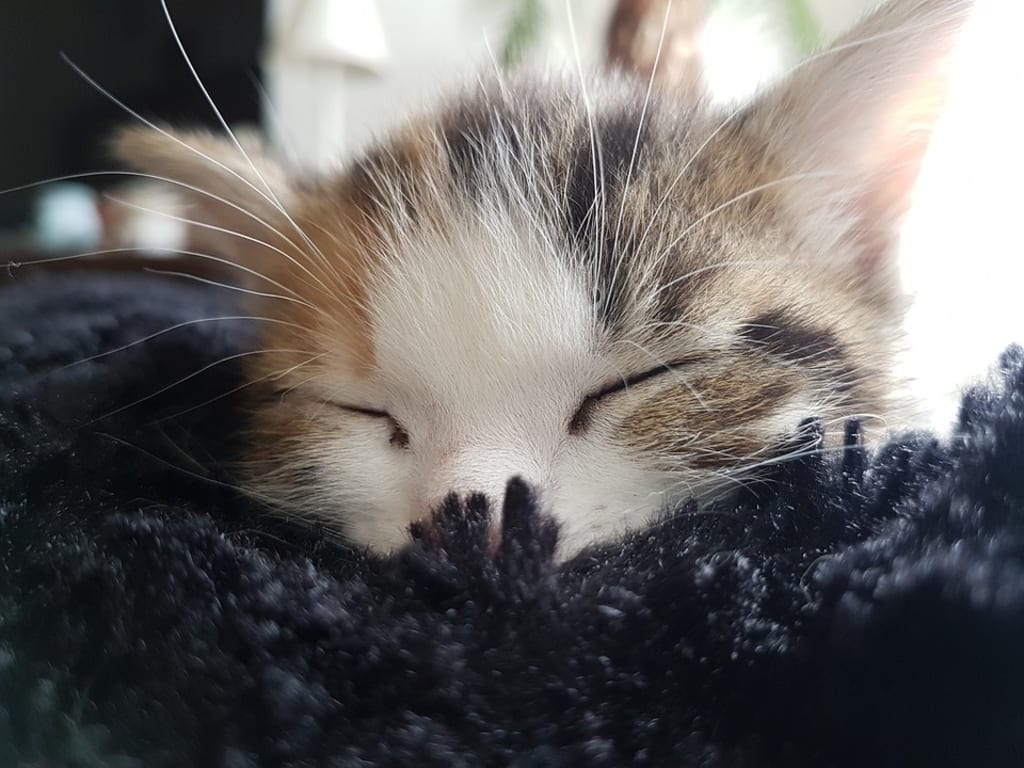How To Curb Your Cat's Nocturnal Activity
A Guide to Help Pet Owners Get a Better Night's Sleep

As any cat owner knows by now, cats are essentially nocturnal creatures. Whether they are getting random bursts of energy and running all around your bedroom or biting your toes, this nocturnal activity can be disruptive to their owner's sleep. These nightly disruptions can take a toll on a human's health and productivity due to the lack of REM sleep. As cute as your pet is and as much as you love them, you no longer need to sacrifice your precious sleep time to keep them entertained. With these tips, you can curb that activity and even start training your cat to sleep when you do.
Daytime Enrichment
Cats sleep for approximately 16 hours a day. Unfortunately, these hours tend to be used during the day while humans are at work or school. To help keep your furry friend busy during the day try getting some new toys to pull their focus. You can try battery powered toys that will play with them in your absence or even leave out some cat nip for your cat to investigate before you leave for the day. Another trick could be to hide treats around the house for your cat to find, or use a ball that releases treats while your cat plays with it. Any combination of these things can keep your cat active and engaged during the day. Make sure you take note of what your cat likes best in order to maximize this system.
Scheduled Play
When you do come home, schedule at least two play sessions in the evening and don't stop until your cat is visibly tired or breathing heavily. A laser pointer or ribbon toy can be excellent tools for this type of play and will keep your kitty interested until they are nice and worn out. If you keep up the routine, your cats will learn to expect it and be ready and waiting to play. This is a great way to bond with your cat, as well as get them some exercise which is important for indoor cats. This will also help release your cat's stored energy so it won't come out in the form of zoomies, or seemingly random bursts of sprinting from room to room, later on.
Change Up Meal Times
Feeding a cat a big meal right before you go to bed is an ideal way to get them sleepy. Cats will sleep soundly after eating, effectively allowing you to fall asleep in peace. If your cat is used to an earlier meal, you can give them a small portion of their dinner at the usual time, then save the rest for later to get them acclimated to the new system. If your cat still wakes you up for more food in the middle of the night, try a timed feeder. Your cat will quickly learn the time that the food is released and will wait at the food bowl instead of bothering you. If you do implement a timed feeder, reduce the size of your cat's other meals to ensure they are not gaining weight. If you have multiple cats and one tends to hog food, try using multiple feeders to ensure that one cat does not steal all of the food.
Keep Them Out of the Bedroom
For a pet owner, this is probably the hardest suggestion and would most likely be used as a last resort. Cats generally enjoy sleeping on the bed just as much as their owners like having them close by. But sacrificing sleep night after night is not healthy for anyone. If your cat is stubbornly refusing to give up their nocturnal ways, you might need to start closing them out of your bedroom at night. This will be a difficult transition for them and they might put up a fuss at your closed bedroom door. Try putting double sided tape on the floor in front of your door, cat's don't like the feel of it and will not walk on it. If they are persistent in meowing, try putting a fan in front of the door, that will blow air out towards them. This will keep them back from the door and drown out some of their noise. A white noise machine in your room can help as well. Eventually, your cat will adapt to this routine and they will learn to entertain themselves or sleep elsewhere in the house.
Seek Professional Help
If none of these tips work, you can always seek out some help. You can consult your vet for some tips specific to the temperament of your cat, your vet may also refer you to a veterinary behaviorist if they feel it's appropriate. Or you can consult a Certified Applied Animal Behaviorist (CAAB or ACAAB) and see what they recommend. Animal Behaviorists are the experts in training animals and they can interpret your cat's behavior and determine the best route for you to take.
As a pet owner, much of your life revolves around meeting the needs of your pet. However, you cannot sacrifice your own health and your sleep or you will not be able to be there for them as fully as you would like. Use these tips to help you care for your little friend while also caring for yourself.
About the Creator
Alina Gallupe
I am a graduate student of Mental Health Counseling in Cambridge, MA. I strive to combine my mental health knowledge and my love of writing to explore all topics related to the human experience. I am also a dedicated cat mom and home cook.
Enjoyed the story? Support the Creator.
Subscribe for free to receive all their stories in your feed. You could also pledge your support or give them a one-off tip, letting them know you appreciate their work.







Comments
There are no comments for this story
Be the first to respond and start the conversation.